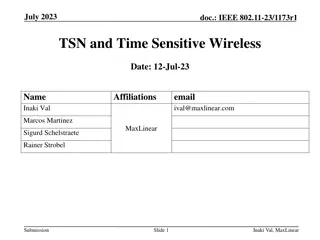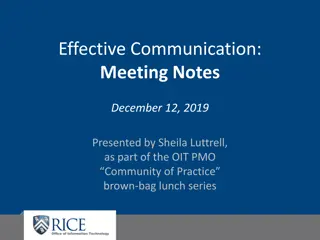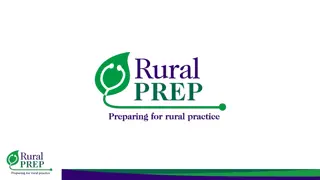Important Notes for Facilitators on Sensitive Topics
Topics discussed in the notes are sensitive and require safe facilitation. Emphasis on confidentiality and reporting duties is crucial for creating a secure environment. Guidelines for setting rules and respecting all participants are provided, including pronoun etiquette and trauma awareness. The document also touches on the importance of using lube for safe and comfortable sexual experiences.
Download Presentation

Please find below an Image/Link to download the presentation.
The content on the website is provided AS IS for your information and personal use only. It may not be sold, licensed, or shared on other websites without obtaining consent from the author.If you encounter any issues during the download, it is possible that the publisher has removed the file from their server.
You are allowed to download the files provided on this website for personal or commercial use, subject to the condition that they are used lawfully. All files are the property of their respective owners.
The content on the website is provided AS IS for your information and personal use only. It may not be sold, licensed, or shared on other websites without obtaining consent from the author.
E N D
Presentation Transcript
1/3 Read before presenting Notes for Facilitators These topics are sensitive to some people and the way you facilitate these presentations is important. Please ensure you are hosting these topics in a safe and considerate environment. Remember to touch on confidentiality, and address the Duty to Report. It is important for those participating to feel this is a safe space, and be aware of what that entails. The Children and Family Services Act, states that everyone has a duty to report a child that is in need of help. Facilitators have a duty to report if there is a belief that child is being (or has been) neglected or abused (sexually, physically or emotionally). A child is considered anyone 19 and under if the abuser is a family member, and 16 and under if the abuser is a non-family member.
2/3 Notes for Facilitators Set rules for the space. Ensure that those within the space are coming up with the rules to allow for buy in from the group. The following are some suggestions: Feel free to take a step out of the space if needed Feel free to pass when you do not want to or feel comfortable sharing Speak for your own experiences Take the lessons, not the details Be aware of your impact Frame above as a base then you can ask if participant have any other rules, this aids in buy-in, especially if you are presenting to school-aged youth.
3/3 Notes for Facilitators Not everyone is binary and/or their gender expression may not match with the stereotypical pronouns you think to use. Ensure you are being respectful of everyones pronouns, it s better to ask than to guess incorrectly. Broadly define relationships by refraining from binary and heteronormative language and examples. Remember that gender identity and gender expression are different from sexual orientation. Some topics may bring back trauma, it may help to have 2 presenters so one can check-in on people who need to leave the room. A content warning example can be seen below: Some topics touched on in this presentation can bring trauma back to the surface. If you feel like you need to leave the area or need a break please just step out.
Youth Health and Support Centre LUBE 101 The Red Door: Youth Health and Support Centre
What is lube? Lube is a short form for lubricant. Lube is essential to safe and comfortable sex. You can purchase lubricants from most pharmacies near the condom selection. But before you go pick up your lube you should know a few things first
Lube 101 Lube doesn t just make sex more comfortable and pleasurable but also makes it more safe. Not having enough lube can cause abrasions within the vagina and anus, which increases the risk of infections. Not enough lubricant can also cause friction. Friction causes condoms to break, increasing the risk of pregnancy and sexually transmitted infection (STI).
When do I need it? Vaginas produce natural lubrication, but not all produce enough for safe, comfortable sex (even when turned-on/aroused), that is normal and okay! Anal penetrative sex require lube as the rectum does not produce natural lubricants. Lube use during masturbation can make masturbation more comfortable. Basically any time you think you want or need more lubrication during sex.
How much do I need? The amount of lube to use depends on how long you re planning to have sex, what type of sex you will be having, and if there is naturally produced lubrication (and how much). Basically any time something starts feeling less slippery and more dry, it s time to reapply. Always communicate your lube needs with your partner.
What Type Do I Use? There are three main types of lube and a few variations of those 3 you need to be aware of. The three main types are water- based, silicon-based and oil-based lube. There are flavoured and desensitizing lubes.
Pros and Cons Get absorbed quickly Need to reapply more frequently Don t work well in water (if having sex in shower, bathtub, etc.) Compatible with most* sex toys Compatible with condoms Generally non-staining Easy to wash off
Pros and Cons Compatible with latex condoms Ultra Slippery Doesn t get absorbed quickly, meaning less reapplication Compatible with use in water (if having sex in shower, bathtub, etc.) Not safe with most* toys (any silicone based toy will degrade with silicone lube) Can cause irritation for some people
Pros and Cons Do not flush from body well Increases the risk of getting a urinary and/or vaginal infections Degrades latex condoms (causing tear, rips, breaks) Can stain sheets Good for masturbation with a penis Safe with most* sex toys
An Important Point Some people avoid lubes containing glycerine, thinking it contributes to yeast infections, but there s no clear science to support this.
An Important Point Though desensitizing lubes can seem appealing to manage sex that may cause discomfort, remember that pain and discomfort is one way your body lets you know something isn t quite right. You want to know when something hurts so you can stop.
During Sex If you are having sex with a partner you need to communicate your lube needs with them! It s starting to get dry, let s add more lube Bring it
Application Remember, lube can be cold at first. Some people don t like the cold shock of directly applying the lube. To warm the lube put some in your hand first, then apply to the desired body part and/or toy.
Sex Toys & Lube ALWAYS check to see which lubes your sex toys are compatible with. For example silicon lubes will degrade and compromise your silicon sex toys. Ensure you are using the correct lube to help your sex toys last and be safe.
Thank You! Presentation created by: The Red Door Kentville NS www.thereddoor.ca























